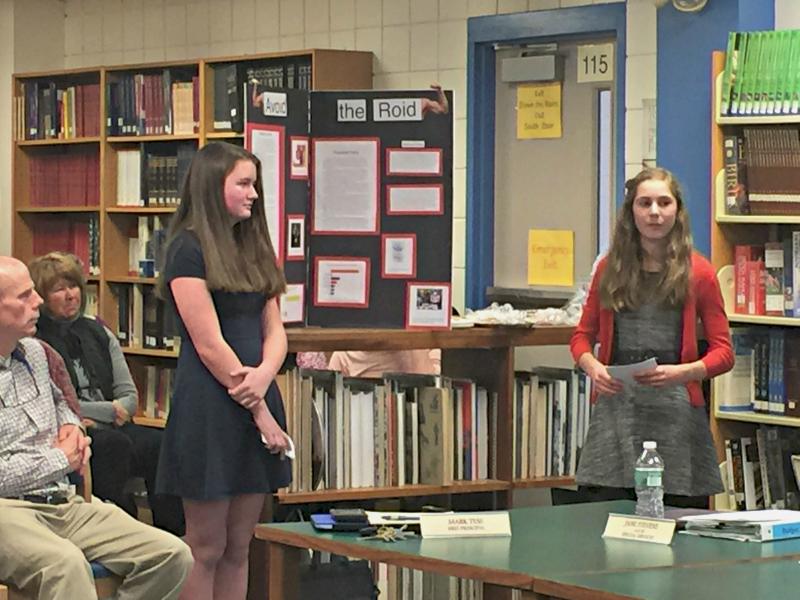Boothbay Region Elementary School teachers Cory Chase and Nick Scott have teamed up for Project Citizen, a six-week-long, project-based learning program now in its eighth year at BRES.
At the CSD School Committee meeting on March 11, Chase and Scott brought two eighth grade students, Riley Sullivan and Olivia Paolillo, to present their project to the committee.
In Project Citizen, students pick a problem that exists in society. It can be a local, state or national problem. It can be school-related or not. Once they've chosen their topic, they research the issue and identify the problem and propose solutions to fix it. They prepare an essay, oral presentation and documentary film.
“It's a very in-depth project, demanding of students,” Scott said. “The students sometimes use SurveyMonkey (a free online survey tool) to get real-time responses from the community for their projects.”
“It's a project that combines language arts and social studies,” Chase said.
Sullivan and Paolillo presented their project, “Avoid the Roid,” all about the dangers of steroid abuse. They spoke about the most common reason for steroid abuse, which is to increase one's ability in sports. They talked about the dangers of using steroids, including increased aggression, facial hair in women and baldness in men.
According to their survey, one in 20 teens admitted to using them, and they said students who start using have trouble stopping, because once they do start, their increased abilities will fade.
According to Sullivan and Paolillo, the NCAA has a policy of a one-year ban on sports if a athlete is caught using steroids illegally. If the athlete is caught a second time, a permanent ban is placed. In some Texas schools, student athletes are being required to take drug tests. The girls said these tests are unconstitutional and an invasion of student's privacy.
Instead, they proposed the solution of funding the ATLAS and ATHENA programs, which promote healthy habits and nutrition while preventing substance abuse.
The programs are tailored for both genders, and aim to reduce the use of steroids, sport supplements, alcohol and illicit drugs in boys, and substance abuse, disordered eating and diet pill use in girls. Both programs focus on decision-making skills and why these things should be avoided, not just telling students not to, but also explaining why, according to www.atlasathena.org.
The students said their plan of action was to contact Sen. Susan Collins, the Department of Health and Human Services, and the Department of Education to suggest the ATLAS and ATHENA programs be fully funded and incorporated into the sports curriculum of schools to prevent substance abuse.
After the girls’ presentation, the video documentary of another project was shown, that one focusing on prescription drug abuse. The video was made by Hannah Gentry, Alexi Davidson and Gerald Gagne. They spoke about the easy access kids and teens have to drugs being taken by parents and grandparents, and the various dangerous ways they were being used, including parties where large quantities of pills are mixed together and doled out randomly. They also spoke about the abuse of the drugs by those prescribed them, including students their own age.
They proposed creating a nationwide tracking system for doctors so they could view a patient's drug use history. They hypothesized that this way, two different doctors wouldn't prescribe the same drug at the same time. They said this system would have to be federal to work, and would take a little extra time for the doctors to update, but it seemed to the students the best solution. They also discussed the importance of keeping medications in a safe place, so they would be used only by those they are meant for, and only used in the correct manner.
After the film, Board Chairman Larry Colcord congratulated the teachers and students on the work they did, stating how impressed he was that the work was being done by eighth grade students. His sentiments were echoed by the others members of the board.































